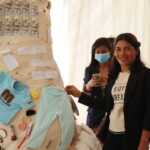By Nicola Bullard
March 2001
For those of you worried about the future of capitalism, take heart. According to Tomorrow magazine – a glossy “global sustainable business” monthly — “the untapped market of the very poor is the new frontier for business growth in the 21st century.”
At last the business community has tumbled to what the WTO and the World Bank have known for a long time: if you’re looking for a way to save your neck, you need look no further than the billions of poor who are simply waiting to be lifted out of poverty by transnational corporations, trade liberalisation and poverty reduction strategies.
Tomorrow is so off-the-wall that it could be a parody. The front cover of Number 1, Volume XI (yes, it’s been round for ten years – no doubt a product of post-Rio euphoria) is a tasteful black and white blur of a thin dark hand being held a somewhat paler, somewhat chubbier hand, with the caption “Reaching Out: It’s time to look beyond traditional business models to the markets of the future – meeting the unmet needs of the world’s four billion poor.”
The lead story “The Bottom of the Pyramid” by “business visionary Stuart Hart” explains how “multinationals can help people rise out of poverty.”
Hart argues that poverty is one of the “greatest obstacles standing in the way of an accelerated transition into sustainability.”
“When you’re scrabbling to survive,” he says, “broader concerns about the environment can seem effete and irrelevant.” But for a visionary the solution is simple, “Sustainability requires massive reductions in poverty and that means bringing billions of people into the market economy.”
Hart does note the irritating problem that poor people don’t have a lot of cash but cheerfully informs us that some equally visionary corporations – such as Unilever and Johnson & Johnson — have found “strategies” to target the very poor. Maybe he’s referring to the ribbons of small sachets of shampoos and soap powders which festoon local markets throughout Africa and Asia. The marketing “strategy” is simple: a tiny packet of shampoo costs 2 or 3 baht (relatively more than double the price of a large container), yet every village girl can afford this small outlay. What’s more, Thai TV advertising is an endless parade of beautiful young women with long glossy hair swirling without a care – obviously commercial and chemical shampoos are not only better than traditional or local products, but they also make you more beautiful, richer and more modern. Who can blame the village girls for buying the brightly packaged foaming chemicals when they are subjected to such relentless hair-swirling!
But business also needs to change its attitude to the poor, says Mr Harris. “Where there’s abject poverty, managers need to visualise an active market; it’s like visualising a theme park where today there’s only a swamp.” Apparently those lucky enough to live in abject poverty will be able to make the transition from invisibility to consumerism, without having to pass through the painful stage of being human, thanks to the “visualising” powers of far-sighted entrepreneurs.
There is more, of course but at the risk of spoiling a good story, let me tell you how this theme-park fantasy ends. “Who knows?” the visionary muses. “In 20 years time the tide may turn and the MNCs will be celebrated as the heroes and not the villains of globalisation.”
No doubt by now you want to get your own copy of Tomorrow.
Well, if you happen to be a “large stakeholder group” to any of the following corporations, you will probably get one in the mail: ABB, Dow Chemicals, Du Pont, Novartis. Or maybe you’re connected to 3M, BP, British Telecom, Deloitte Touche Tohmatsu, Duke Energy, Ford, Nokia, Rio Tinto, Shell or Unilever. If so, you can also ask them to send you a copy. Or maybe you have friends at the Wuppertal Institute for Climate, Environment and Energy, the Centre for Science and Environment or Legambiente, who are listed as providing “expert support.” Perhaps some of our friends in these reputable organisations should reconsider whether Tomorrow deserves their “expert support”.
Poor held aloft in the trade liberalisation crusade
And it’s not only the corporations who should be thankful that the poor “will always be with us” because without them, the WTO would be finding it very hard to flog a new trade round – euphemistically called a “development round.”
WTO Director General Mike Moore once again trotted out the poor – holding them like a flag a the head of the charge — to justify the crusade of trade liberalisation at a recent roundtable on trade and poverty in least developed countries.
Moore declared that “The multilateral trading system has probably done more to boost living standards and lift people out of poverty over the past fifty years than any other government intervention.” It would be interesting to put that proposition to the vote. Would China, for example, which has achieved a phenomenal absolute reduction in poverty concede the credit to the multilateral trading system? Or would it square with the analysis of the UNCTAD 1999 Trade and Development Report that the greater openness of developing countries in the 1990s has been associated with higher volatility, larger payment deficits, and inferior growth performance?
By equating “trade” with “trade liberalisation” Moore deliberately perpetuates the view that anyone who opposes a no-holds barred new round of trade negotiations is not only anti-poor, but anti-trade. He also conveniently ignores the fact that for 45 of the last 50 years, trade liberalisation was managed through the much more open and flexible negotiating forum of the GATT. The rules-based, coercive and non-democratic WTO is something else again.
This is an old strategy. Even before the collapse of trade talks in Seattle, the WTO realised that their best public relations tactic was to persuade the public that “free trade is good for the poor.” And even though “the poor” will apparently benefit from more trade liberalisation it would be very inconvenient to actually listen to what they have to say.
Via Campesina, an international movement of more than 2000 farmers and peasants organisations, wants agriculture out of the WTO. The millions of Africans dying from AIDS (most of whom are very poor) are demanding that drug companies stop manipulating intellectual property rights to protect their profits. Teachers and health workers in developing countries are calling for a moratorium on the negotiations on the liberalisation of services (GATS), fearing that further liberalisation of services will destroy what little of the public sector has been left by structural adjustment.
The “poor” have names: they are farmers, people dying from AIDS, underpaid primary school teachers, landless peasants living in slums on the edge of the sprawling metropolis, women selling fruit by the roadside, illegal migrants working for next to nothing rather than return to their war-torn or economically gutted countries. More trade liberalisation of the kind offered by the WTO will not benefit them. What will is more government intervention, not less. Better and affordable public services, not privatisation, land tenure not property markets, more jobs and job security, stable prices for agricultural products, technology to build local productive capacity, and protection from the vicissitudes of export and financial markets. None of these issues is on the agenda for the new round.
* Nicola Bullard is deputy director of Focus on the Global South in Bangkok







